DIY Cannabis Topicals: A Step-by-Step Guide

- 1. How do cannabis topicals work?
- 2. Should you use raw or decarboxylated weed for your homemade cannabis topical?
- 3. What issues can cannabis salve help with?
- 4. How to make cannabis salve
- 4. a. Ingredients and supplies to make cannabis salve
- 4. b. Step 1: decarboxylating your marijuana buds
- 4. c. Step 2: making cannabis oil
- 4. d. Step 3: blending everything together
- 5. Turning your cannabis salve into lotion or cream
- 5. a. Necessary ingredients to make weed lotion
- 6. The benefits of cannabis topicals
- 7. The best fast buds strains for cannabis topicals
- 8. The bottom line
When it comes to marijuana, the methods of consumption seem to be limitless. In fact, given weed was only reborn into today's society relatively recently ago, we are still finding newer ways in which this magic plant seems to work. However, marijuana isn't a modern world, or rather contemporary, substance. In fact, marijuana plants have been in use for over ten thousand years ago, in Ancient cultures such as Chinese, Indian, Egyptian, Greek, and Dutch. 1 What has changed though, is that, with our more advanced technologies, now we have the science to prove the actual benefits and uses of the different products, and make the most out of them.
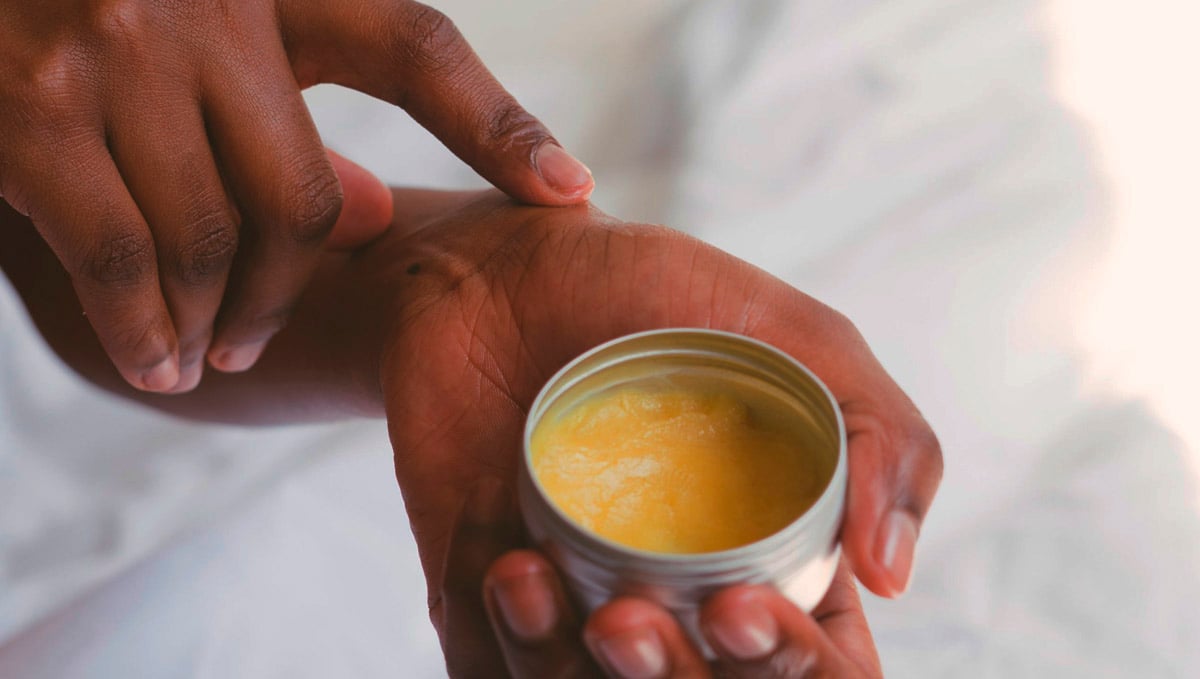
For instance, some weed-based products always prevail in their usual form, no matter the time being. Cannabis topicals, a.k.a. lotions, creams, and salves are one example of this. Besides, there isn't that much science involved in making such cannabis-infused lotions, creams, or salves. In this article, let's find out how to make them from homegrown feminized seeds!
1. How Do Cannabis Topicals Work?
Marijuana-infused topicals, such as lotions, creams, salves, oils, balms, and lubricants are all forms of weed products that take action directly on our skin, working on the targeted area by entering the first two layers of our skin, the epidermis and dermis. The best aspect about cannabis topicals is that they make a great alternative for those people who want to benefit from the use of marijuana but they would rather not get high. Since topicals don't get into our bloodstream, unlike transdermals which do, there should be no worries about getting the typical weed high.
Ultimately, cannabis topicals seem to work so well for many people because of the way they interface with the endocannabinoid system (ESC). Have you ever heard of this network before? If not, we don’t blame you—it still doesn’t show up in some medical textbooks! However, modern scientists are continuing to unveil the critical role it plays in human health and physiology. Known as the universal regulator of the human body, this massive signaling network shows up all over the body, including the central nervous system and brain, skin, bones, digestive system, muscles, fascia, and elsewhere. Overall, it’s composed of three distinct parts: signaling molecules (known as endocannabinoids), receptors, and enzymes that both build and break down the signaling molecules.
Our cells make endocannabinoids on demand, which then bind to ECS receptors in order to create the desired changes within target cells. Interestingly, cannabinoids found in weed flowers share a similar shape with our endocannabinoids, allowing them to bind to the same receptors. In the skin, the ECS is responsible for numerous key processes, including the proliferation, differentiation, and survival of cells. Cannabinoids from topical extracts also impact the same receptors, and researchers are looking to see if they can help with a range of skin conditions, including eczema and psoriasis. So, if marijuana topicals sound exactly like what you've been looking for, let's find out how to make your own at home!
2. Should You Use Raw or Decarboxylated Weed For Your Homemade Cannabis Topical?
Decarboxylation is the process of heating cannabis at low temperatures for a particular length of time to transform the raw, base cannabinoids from their acidic form to their more active and potent version. This happens naturally when you smoke or vape, as the fire or heating element instantly decarbs the weed. But, when we are using our weed to make edibles or topicals (among other products) decarboxylation isn’t necessarily a given. The medicinal uses of decarbed weed have been well researched and documented over the past decade or so, with CBD and THC taking center stage. Both cannabinoids have great anti-inflammatory, pain-relieving, muscle-relaxing properties with high levels of anti-oxidants and some evidence to show that they can help in tumor suppression. But, as this research continues, we are starting to see some pretty impressive perks to raw weed, and as such the acidic versions of these cannabinoids. So, the question remains… Should you use raw or decarboxylated cannabis for our topicals? Well, beyond the well-known THC and CBD, there are a total of 111 other cannabinoids that have been isolated at the time of writing. This makes it hard to really give a full and well-researched answer, as many of these compounds have never really seen the inside of a lab apart from being identified.
Even though 37 out of 50 states in the US have legal recreational cannabis laws, it is still classed as a schedule 1 drug alongside heroin, cocaine, MDMA, and methamphetamine.
This means that researchers are handcuffed when it comes to access to high-quality cannabis to study, and the legality to run such tests. Schedule 1 classified substances are deemed to have “no currently accepted medical use and a high potential for abuse”. Crazy, huh? So, in general, we suggest using a well-balanced mix of both raw and dercarbed cannabis when making topicals. The pure fact that you will not feel any psychoactive effects from topical usage no matter the THC percentage means there really is no reason to not use a mix of both. In our opinion, this offers the most well-rounded product with the best medicinal properties.
3. What Issues Can Cannabis Salve Help With?
We want to be super clear here, we are not making any sweeping statements saying that cannabis salve is a magic potion that can heal every and all dermatological issue. But with that being said, there is a bunch of evidence pointing to the fact that cannabis salve is outstanding at providing at least some level of relief for a wide range of issues. The skin-nourishing qualities of beeswax and coconut oil have been well researched and proven beyond a shadow of a doubt, so any topical with these as the base will ensure the moisture provided will help with any and all dry, cracked, or otherwise irritated skin issues.
The specific healing properties of your cannabis salve will be in some way determined by which strain or strains you decide to add to the balm, but we can give a general list of the health problems cannabis topicals can help relieve. Keep in mind this is not a complete list, just a short cross-section.
- Muscle spasms and deep aches
- Carpal tunnel syndrome
- Arthritis and osteoarthritis
- Period cramps
- Rashes
- Eczema
- Dermatitis
- Inflammation
- Stiff and sore joints
- Acne
- Psoriasis
- Migraine Pain
- Anxiety and Depression
4. How To Make Cannabis Salve
The good news is that making cannabis topicals is quite easy in fact, so gather your necessary supplies and let's get to it! In this article, we'll cover a couple of different recipes for making weed topicals.
Ingredients and Supplies to Make Cannabis Salve
To make a weed salve you'll need the following tools and ingredients:
- 7 to 10 grams of dried, cured, and grinded marijuana buds;
- 5 grams of raw weed, optional;
- 1 ½ cups of coconut oil or other oils, coconut is a great option because it blends well with cannabis;
- 1/3 cup olive oil, optional;
- 1/3 cup beeswax;
- A baking sheet;
- A saucepan;
- A glass jar;
- Cheesecloth or a thin strainer;
- And a few drops of any essential oil of choice.
Once you've gathered all of the required supplies you're ready to start making your weed salve!
Step 1: Decarboxylating Your Marijuana Buds
The first step towards making your own cannabis salve is decarboxylating your weed buds. What is decarboxylation? Allow us to explain. Decarboxylation is the process through which we convert the acidic form of weed's cannabinoids, present in raw weed, into their active version. How does this happen? Two major factors are required, heat and time.
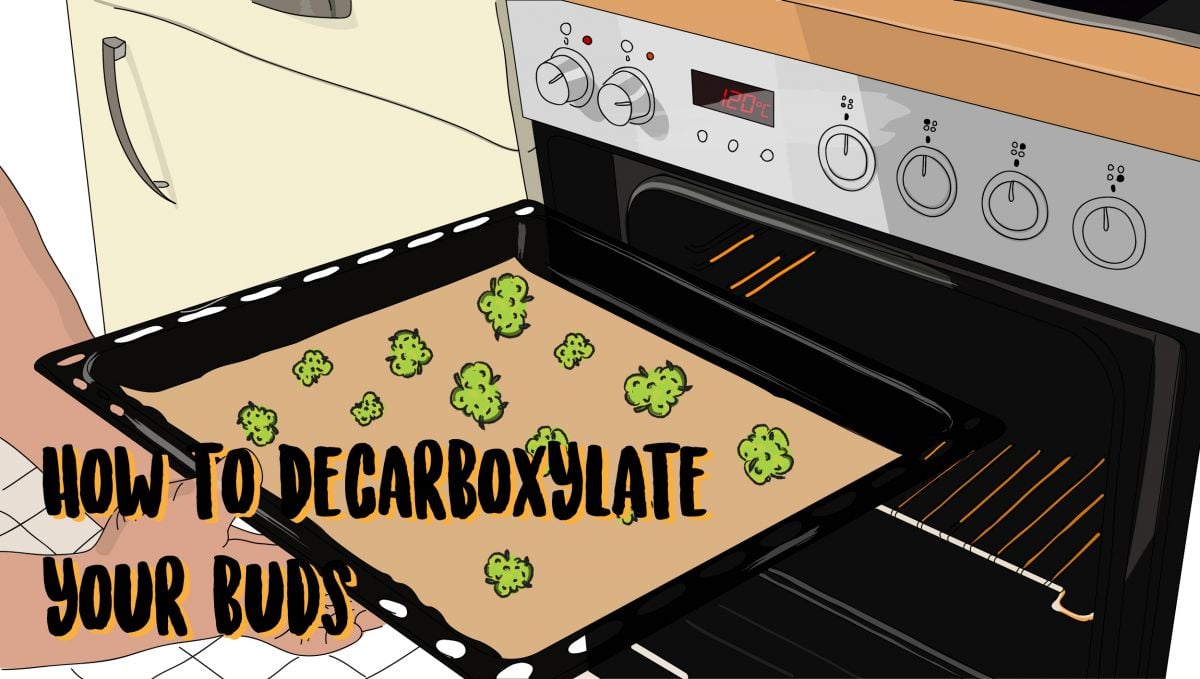
The first part of the decarboxylation process is when we first harvest marijuana, it's through the curing process that we can control trichome degradation. The trichomes start to transform as they age and get oxygenated. This is also why it's important to store your buds correctly, too much oxygen could accelerate the degradation process affecting the end result. The second part of the decarboxylation process involves heat. When we smoke or vape weed, this takes place instantly. But when we need to use our buds for cooking recipes, or for making topicals, we need to put our buds through the decarb process ourselves. Let's see the chart to understand at which temperature the raw form of THC, THCA turns active:
| Temperature | Time | |
|---|---|---|
| Turning THCA into THC | 90 to 110 °C / 200 to 230 °F | 30 to 45 minutes |
To decarb your buds, separate them into smaller pieces and place them over a baking sheet on an oven tray. Bring the heat somewhere between 90 and 110 °C and put the tray inside for 30 minutes, although, do perform checks in between to prevent a catastrophe from happening: your buds getting burned. Read the full article on decarboxylation ahead:
Step 2: Making Cannabis Oil
The next step to make your cannabis salve is quite similar to making weed oil, the same in fact but with slightly more oil.
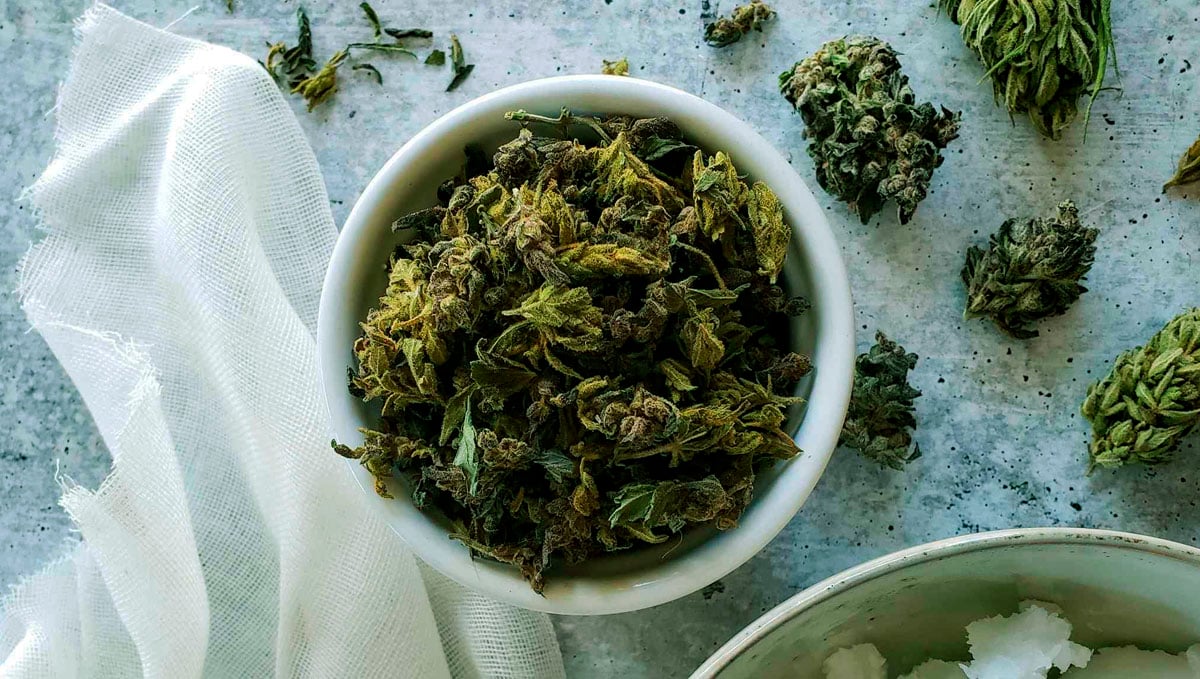
As your buds decarboxylate in the oven, take a saucepan or a double boiler, place the coconut and olive oil inside over low heat and keep stirring continuously. Once the buds have finished decarboxylating, throw them into the pan along with the oils keeping the heat low.
Important!Do not bring up the heat to accelerate the process or you might risk overheating your buds and burning off the THC, which will, in turn, diminish your lotion's properties.
At this stage, if you choose to use raw cannabis as well, then you should throw it in the saucepan as well. Keep stirring at low heat for 20 to 25 minutes, then remove from heat and strain with a cheesecloth or muslin cloth into a glass jar. Finally, squeeze tightly the cheesecloth to strain any remnants.
Step 3: Blending Everything Together
Taking the same saucepan you were using for the oil, add the beeswax in and bring it to heat until you melt it completely. As it's melting, take the cannabis-infused oil and add it into the mix as you stir. If you want to throw in some drops of essential oil to the mix in order to add some fragrance, this is the part where you're supposed to do that. Lavender oil makes great for a soothing salve, tea tree oil also works great, but feel free to explore your options.
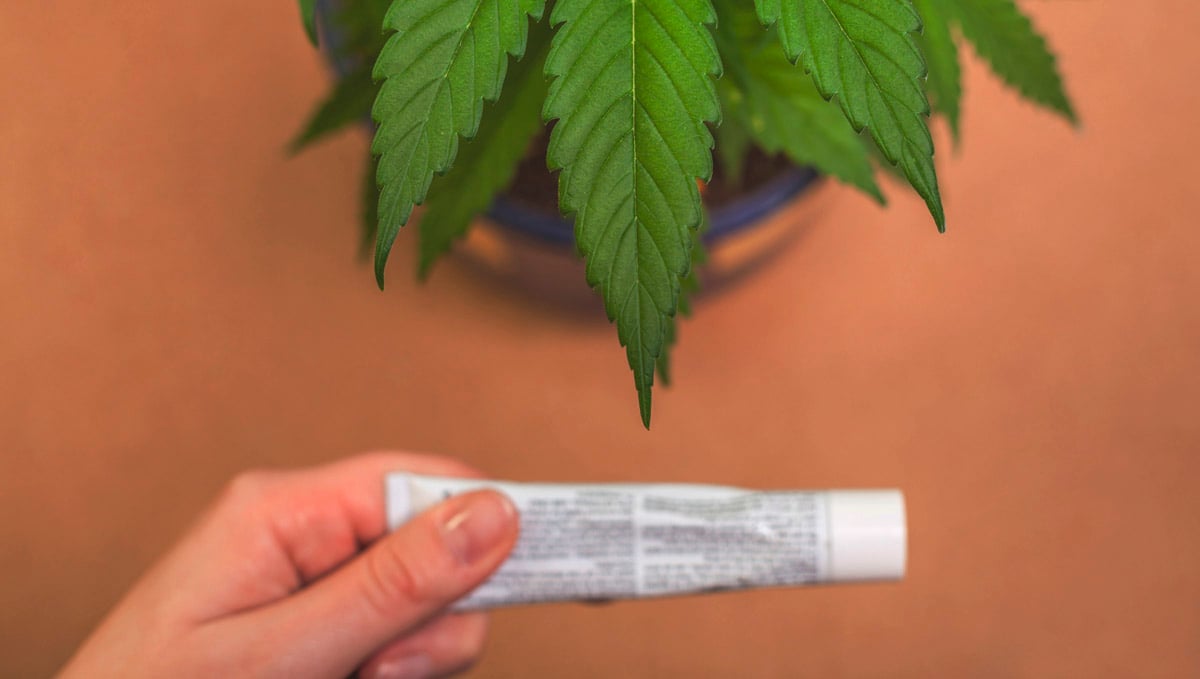
C'est fini! All that's left now that the infused coconut and olive oil and the beeswax have blended well together is pouring the mix into the container where you'd like to keep your weed salve. Store it in a dark and cool place to preserve it better.
5. Turning Your Cannabis Salve Into Lotion or Cream
As you might have noticed, your homemade marijuana salve is quite hard on consistency. If you'd rather turn your salve into more of a lotion or cream, with a more liquid consistency, follow through with the next guide.
Necessary Ingredients to Make Weed Lotion
- 1 teaspoon of oil (it can be olive, almond vitamin E, or any kind of oil);
- 1 cup of aloe vera gel;
- And 2 tablespoons of shea or cocoa butter.
Now all you need to do is add the oil and the shea or cocoa butter into the mix as you heat it in your saucepan. Lastly, throw the cup of aloe vera gel in and mix well. Pour into a container and voilá, your weed lotion is ready to use (once it's cooled down). Keep in mind that the lotion will still be slightly consistent, so we would suggest using a container rather than a lotion pump.
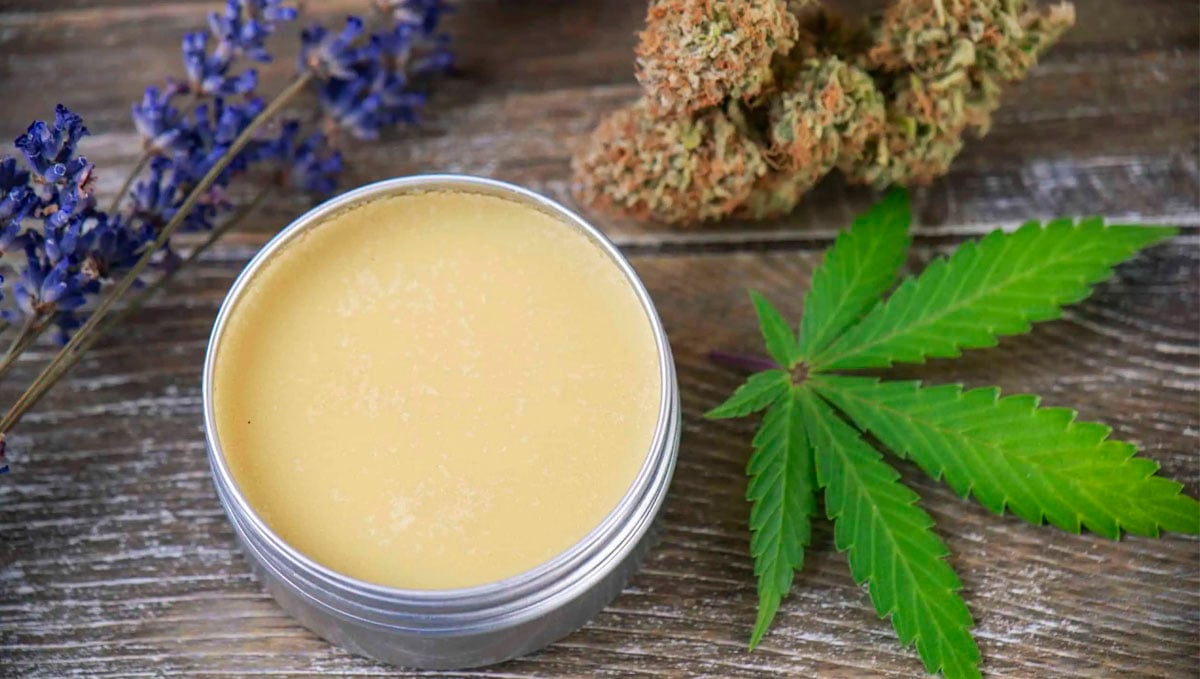
If you feel inspired and like creating, you can vary and play with the ingredients to make your own personalized cannabis balms and creams. For instance, add some color and fragrance to the mix by throwing in some rose petals. Throw in some chamomile oil as well and you'll have an extra soothing cannabis balm there, great for use before heading to sleep. What about cannabis lip balms? Add a teaspoon of honey into the mix, and some frozen berries into your coconut and beeswax blend to create your own homemade flavored cannabis lip balm. Cocoa powder is also a great flavoring option.
6. The Benefits of Cannabis Topicals
Cannabis topicals provide amazing benefits, not only due to the cannabinoids present in the mix but because all of their ingredients are great natural components as well, especially coconut and olive oil. Marijuana salves and lotions can be specifically great for people struggling with muscle pain or skin disorders, such as psoriasis and eczema. The main properties of these cannabis-infused products are their anti-inflammatory and analgesic action, helping with sore joints, arthritis, muscle aches, and more.
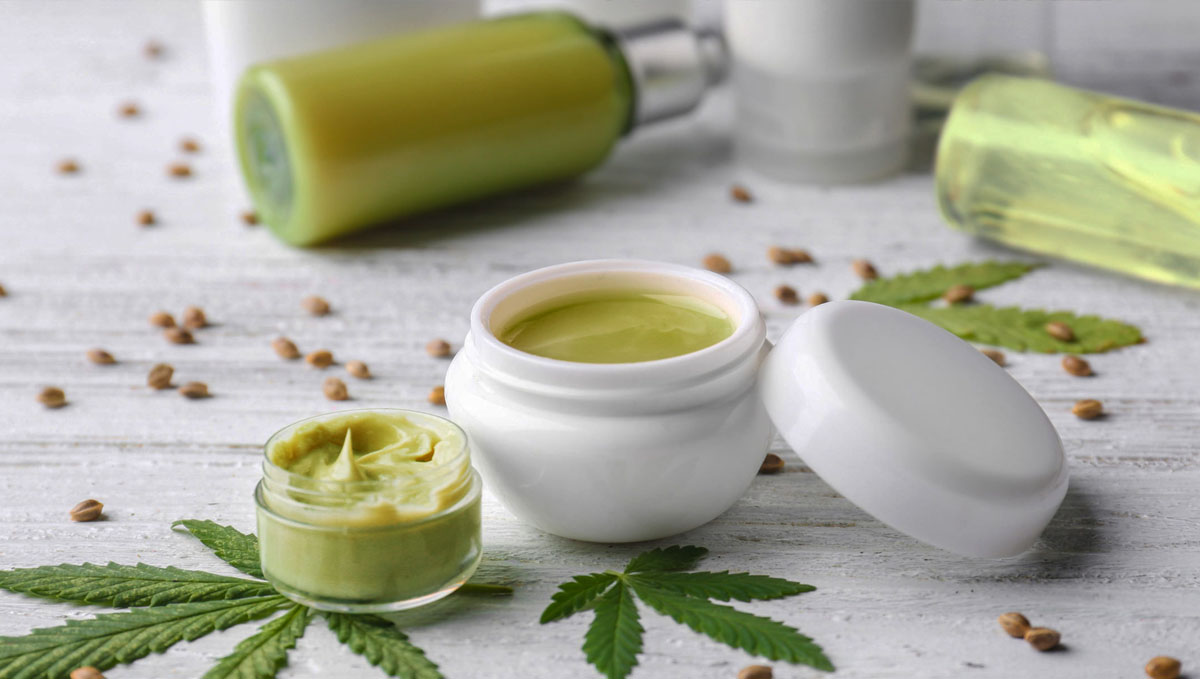
When adding certain ingredients to the mix, for instance, lavender, eucalyptus, or chamomile oil, you enhance the relaxing properties of the balm, ideal for a good night's sleep or to relieve migraines.
7. The Best Fast Buds Strains for Cannabis Topicals
So, which strain reigns as king for making cannabis topicals? That really depends on what you are personally looking for. Maybe you are not interested in THC whatsoever, even though topicals offer zero psychoactive effects no matter the cannabinoid makeup. Well then, we have the perfect strain for you! CBD Auto 20:1 is our heaviest CBD strain with a 20% CBD count, and it comes with less than 0.5% THC. This is our very first pure medicinal strain, and its popularity of it means it certainly won’t be our last! User reviews report several heavy medical uses, from anxiety relief, to sleep aid, to increased appetite in cancer patients. The huge trichome production makes this strain absolutely perfect for users looking to extract all of the cannabinoid goodness for topicals, edibles, or any type of concentrate.
If you love CBD but are looking for a strain that has a nice balance with both THC and CBD then CBD Auto 1:1 (CBD Crack) is the strain for you. With 7% of both THC and CBD, this strain offers a perfect option for those looking for a full-spectrum topical option. The terpene profile is dominated by mango fruitiness and backed up with a hearty dose of floral pepperiness, and just like CBD Auto 20:1 the trichome production is just insane. If CBD isn’t really your thing, and you are more into hybrids then check out Gorilla Punch Auto. This comes with an almost perfect equilibrium of Sativa 45%/Indica 55%, and literally looks snow-covered by harvest time thanks to the highest amounts of trichomes from our entire range. She takes less than 65 days from seed to harvest and offers one of the most insanely potent terpene profiles of an auto to date.
8. The Bottom Line
Didn't we tell you making weed balms, creams and lotions was super easy? Hopefully, this step-by-step guide helped you make your own cannabis-infused cosmetics at home. And of course, allow your inspiration to travel and expand, play with your ingredients and test out the different results! And don't forget to comment on what are your favorite marijuana topicals recipes!
EXTERNAL REFERENCES
- "Cannabis in the Ancient World. Marihuana: the first twelve thousand years." Ernest L. Abel. 1980.







Comments